 07 May 2012, Sweetcrude, LAGOS – NIGERIA has seen a 40 per cent drop in fuel importation in the first quarter of the year, according to the international investment and financial advisory firm, Renaissance Capital.
07 May 2012, Sweetcrude, LAGOS – NIGERIA has seen a 40 per cent drop in fuel importation in the first quarter of the year, according to the international investment and financial advisory firm, Renaissance Capital.
This may well be the up side of investigations into the country’s fuel subsidy regime, following national outrage over January 2012 fuel price hike and calls for end to corruption in national governance, and the petroelum sector in particular.
Renaissance Capital said in its recent macroeconomic updates that the reduction in fuel importation have reduced pressure on the nation’s foreign exchange reserves and could raise Nigeria’s trade surplus to 12.5 per cent of GDP.
“Since the partial removal of the subsidy, petroleum imports have fallen by 40 per cent. If we go by the latest trade numbers for the year to September 2011 and assume a 40 per cent reduction in total fuel imports, which were equivalent to 16 per cent of total imports, this implies a 6-7 per cent decline in the value of total imports,” the investment and financial advisory firm said.
It added: In our estimates, this would have improved the trade surplus by about 1.5 percentage points to 12.5 per cent of GDP and raised the current account surplus to about 9.5 per cent of GDP, from a provisional estimate of 7.7 per cent.”
The company said the marginal improvement recorded in the management of the nation’s external reserves was largely brought about by the latest policy on fuel subsidy.



